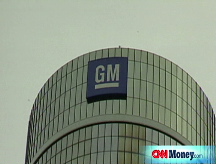GMAC at the brink
General Motors' finance unit is falling short of capital requirements it needs to become a bank holding company and access needed cash from the government.
NEW YORK (CNNMoney.com) -- GMAC Financial Services, the finance unit tied to automaker General Motors, said Wednesday it is coming up well short in its efforts to raise the capital it needs to become a bank holding company, a move the unit is counting on to gain access to needed funds from the Treasury Department and Federal Reserve.
The unit, which is 49% owned by General Motors and 51% owned by private equity firm Cerberus Capital Management, had applied to become a bank holding company last month but warned Wednesday that it may have to pull the application.
The looming failure is another blow to embattled automaker GM (GM, Fortune 500).
GMAC needs to reach $30 billion in capital in order to qualify as a bank holding company. It was looking to do that by offering investors holding about $38 billion of its notes the opportunity to exchange their bonds for new notes and preferred stock, and a limited amount of cash. The preferred stock would have counted towards its required capital.
So far the offer, which has been extended through 5 p.m. ET Friday, has raised only about $8.3 billion in new capital. The company had $9 billion in capital on hand at the end of the third quarter.
GMAC had been hoping to become a bank holding company since that status would allow the firm to tap into the Troubled Asset Relief Program, the $700 billion in bailout funds set up for Wall Street firms and banks in October, as well as the Fed's discount window, the method that the central bank uses to loan money to directly to banks and other finance firms.
While new funds for GMAC would not have been used to offset losses at the automaker as it seeks a federal bailout and struggles to avoid bankruptcy, it was crucial to the finance unit's ability to again start making car loans to potential GM customers.
The finance arm was once a key way for GM to help consumers buy cars. But only 1% to 2% of GM's sales in November were financed by GMAC. GMAC's mortgage loan business, another key source of revenue in the past, has also essentially ground to a halt in recent months.
Further problems for GMAC would be a crippling blow to GM's network of nearly 6,500 dealers, most of which get the financing they need to operate and buy vehicle inventory from the automaker. And GMAC's statement indicated it faces additional, though unspecified problems, due to the failure of its efforts to raise capital.
"GMAC does not believe it has the ability to make further changes to the (offer) following the new deadline," according to the company's statement. "If GMAC is unable to successfully convert to a bank holding company ... by December 31, 2008, it would have a near-term material adverse effect on GMAC's business, results of operations, and financial position."
Duane Paddock, owner of one of the nation's largest Chevrolet dealerships and head of the GM dealership council, said he's still hopeful that if Congress moves forward on a bailout of the U.S. automakers in the coming days, that could turn the tide for GMAC's efforts to raise capital.
"We have to take the first step first and get the government assistance," said Paddock, who had been in Washington working on support for the bailout plan.
But Paddock said that if the bailout bill passes and GMAC is still unable to get the access to capital and cash it is seeking, it would be catastrophic for many dealerships.
"It's just as big an issue as the bailout," he said. "There is no question the overall dealer body needs to have GMAC."
GMAC, once a profit-generating life raft for GM, has had its own problems in the past year due to problems in financial and automotive markets. It reported a $2.5 billion loss in the third quarter, bringing its losses in the past five quarters to $7.9 billion.
In the past few years, GMAC moved away from a focus on auto finance. By 2005, mortgage lending and insurance accounted for 57% of its income. Before the housing bubble burst, GMAC made a big push into subprime lending and so-called Alt-A loans, those made to borrowers who did not provide full documentation of their income. ![]()


